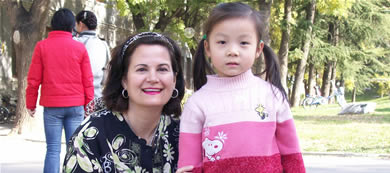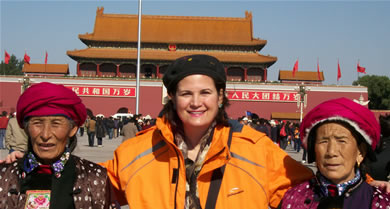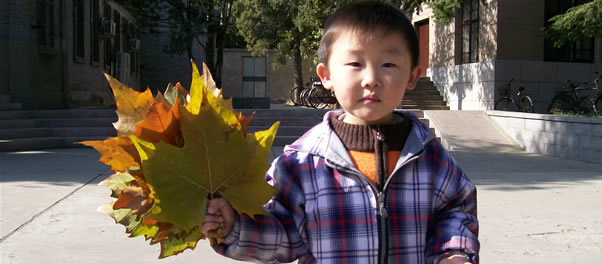Experiencing, and Celebrating, the Cultural Differences
Lesson Eight in Snow’s Job in China
November 5, 2007
By Nancy Snow
Nancy Snow, associate professor of communications, is a visiting senior scholar and professor in Beijing, China, through November. She is teaching a graduate course in public diplomacy at Tsinghua University’s School of Journalism and Communication, as well as working on joint research projects with Chinese faculty. While overseas, she will be sharing her experiences.
Lesson Eight: When in China, take note of and appreciate cultural differences. As I often say, if you want to be interesting, then be interested!
Right before baseball legend Cal Ripken Jr. left for China, the Baltimore Sun ("Cultural differences he might expect," 10/28/07 http://www.baltimoresun.com/sports/baseball/ripken/bal-te.sp.ripken28boct28,0,6066441.story) reported that he "took part in a briefing with State Department officials to help familiarize the former baseball player with some of the cultural differences he might expect during his 10-day visit." I've included the original list provided by the Sun and my own observations in bold. I am no special expert in cultural differences between the U.S. and China, but I hold a Ph.D. from American University's School of International Service with an emphasis in intercultural communication.
* Don't be taken aback when people ask how old you are and how much money you make. For the most part, they're just curious, and it's not considered offensive to exchange salary information upon first meeting.
I've lived in Beijing, China, for two and a half months and not once has anyone asked me how much money I make or how old I am. In fact, this is much more commonly asked in Southern California where I've lived for the past eight years. I had a friend in Los Angeles who told me upon first meeting that she lived in Beverly Hills-adjacent. Huh? I later understood that to mean that if you can't afford the right neighborhood, then live next door to it. Some, but certainly not the majority of So Cal people, judge each other based on zip code, home mortgage sizes and whether you look younger than your years. I've never found that in China, even in a country with a growing nouveau riche. By the way, I've exchanged hundreds of name cards and have yet to answer the supposed first meeting question, "How much money do you make?"

Nancy Snow greets, and has her photo taken, with a little friend.
* Although it might seem normal to ask an American child about his siblings, it's not necessary in China. Because of the country's one-child policy, most children do not have brothers and sisters.
This is downright funny to read. Perhaps it's just a fast food version — attempt — to explain China's family planning policy. I work with hundreds of Chinese students, many of whom have a sibling or two. When I first arrived, I was hesitant to inquire about siblings because in the United States it has been ingrained in us to assume all families in China consist of a mother, father and one child.
When I expressed joyful surprise at hearing about siblings, I realized that the China narrative in America needs some work. It's a cultural stereotype to assume the one-child policy. It's common to have one child in the cities and more children in the countryside, but there is no fixed one-child policy. China's family planning is a work in progress. It's not perfect, and the Chinese are quite frank about problems that include favoring boys over girls. There is a worrisome gender gap here, as well as an aging population that needs a larger number of younger workers to help support the rising life expectancy.
I would encourage anyone who has the privilege to come to China to be respectfully inquisitive about various policies. I've found people very open to discussing ideas and not the least bit defensive.
* When dining, know when to say when. If you finish your meal and your plate is empty, it'll be loaded up with food in no time. So when you're full, leave a bit of food on your plate.
This isn't a bad tip at all. The Chinese spoil their guests with delicious food. I've put on a few pounds since arriving because I couldn't figure out a way to say "when" at a meal. The Chinese eating style is often communal with a rotating serving platter as centerpiece. The diners choose what they want but your Chinese hosts may very well either offer you something from every dish or put a sample on your plate. Loading up isn't what is done here at all, which is why you don't see too many overweight people. This is a country that understands portion control better than many Americans. I suggest that if you don't speak the language, then just gesture toward your belly and say, "I'm full." The Chinese will appreciate that you love their cuisine, which is a major part of their cultural tradition and pride.
* Know your neighbors. There are boundaries that are easy enough to recognize, but some of the labels are a bit fluid. Japan - country. Taiwan - territory. Memorize it. There will be a test.
Know your neighbors is a great tip for various occasions (running out of sugar, watering plants, backyard barbecues, international relations). I won't quibble with this offering and there won't be a test. Anyone who visits a foreign country should study the geography and people before arriving. China has over 50 ethnic groups and 14 border countries, including Afghanistan, India, North Korea, Kazakhstan, Kyrgyzstan, Tajikistan, Russia, Vietnam and Pakistan. It has a need to get along well with its neighbors and we have a need to know China better.
* Show some appreciation. The Chinese love being complimented on their English, even if it's broken phrases or only a few words are recognizable. They're making the effort and appreciate your appreciation.
It's almost a truism in intercultural communication theory that showing appreciation for one's host country will make one's stay more rewarding. I don't know of any country that doesn't care for people showing appreciation. The Chinese are crazy about English and even those who don't speak it are kind about your not knowing Chinese. I have grown to love American English even more from living in China. The Chinese make me feel like my native language is fun and exciting. It reminds me of a lady's purse I saw that had this large bolded phrase printed on it: "Super Lover, Feel My Smile." I told one of my Chinese students that "feel my smile" would be our code phrase for learning English.
* Here's a tip: Keep that cash in your wallet. Whether you're dining out or riding a taxi, no tip is necessary. It's not insulting to offer a few extra bucks, but it's also not expected.
To any American, this is a nice surprise but it does take a bit of getting used to since we are so ingrained to tip. Be careful and don't throw your bucks around to impress. You will find a lot of people who will not accept any money as thanks. I've met numerous Chinese who were quick to treat for dinner, massage, facial, etc. There is a natural hospitality to this country that one should enjoy. In return, always show an interest in learning more about China. And it wouldn't hurt to bring along some U.S. hats, T-shirts, pens, mugs or other memorabilia to share with your hosts. There is a great deal of affection from young and old for all things American, including T-shirts with English writing, university logos or sport team hats.

Nancy Snow makes new friends while visiting various sites, including Tiananmen Square.
* Bring an umbrella. Though government officials are encouraging residents to curtail some bad behaviors before next summer's Olympics, spitting is still quite common. Whether you're walking on the sidewalk, doing some shopping or getting a bite to eat, it's best to just accept the flying saliva as part of the ambience.
You don't need an umbrella in China except to ward off the bright sun or pouring rain. The Chinese government is making efforts to educate the public, particularly men from the countryside, to avoid spitting in public. They have handed out flyers in anticipation of next summer's Olympics, knowing full well that Westerners will not warm up to the habit. Spitting is a public health issue, not strictly a cultural difference. But to suggest that there is so much spitting that one needs an umbrella is ludicrous and harmful to intercultural communication.
I suppose that the writer of this article may have been trying to make a point through humorous exaggeration. The problem is that someone in America will actually believe that spittle is raining down on those of us living here. I've got as much sense of humor, if not more, than the next guy, but "bring an umbrella" in this context isn't funny. I've been completely impressed by this very complex, fascinating, rapidly developing world economy, and a poor attempt at humor misses the opportunity to truly educate readers about a country that will in a few short decades surpass the economy of the United States.
I attended a talk Cal Ripken Jr. gave to the American Chamber of Commerce in Beijing. I had a brief chance to meet this baseball great and he is a wonderful sports ambassador for the United States. Ripken has a natural down-to-earth manner, easygoing friendliness, and shows obvious passion for kids and sports. With or without Karen Hughes, let's hope that the State Department will continue these win-win public diplomacy programs.
Nancy Snow’s email address is nsnow@fullerton.edu.


